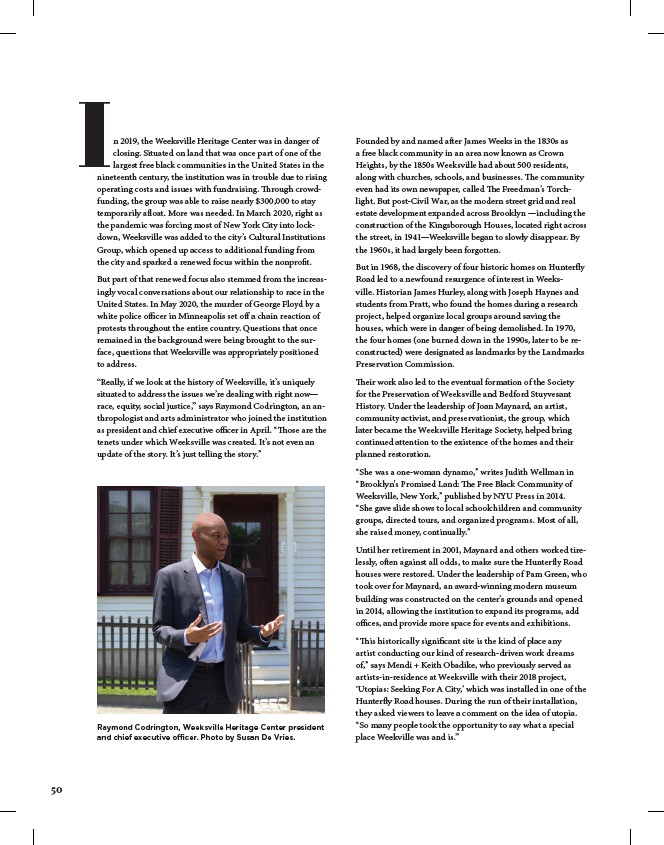
50
I n 2019, the Weeksville Heritage Center was in danger of
Founded by and named after James Weeks in the 1830s as
closing. Situated on land that was once part of one of the
largest free black communities in the United States in the
nineteenth century, the institution was in trouble due to rising
operating costs and issues with fundraising. Through crowdfunding,
the group was able to raise nearly $300,000 to stay
temporarily afloat. More was needed. In March 2020, right as
the pandemic was forcing most of New York City into lockdown,
Weeksville was added to the city’s Cultural Institutions
Group, which opened up access to additional funding from
the city and sparked a renewed focus within the nonprofit.
But part of that renewed focus also stemmed from the increasingly
vocal conversations about our relationship to race in the
United States. In May 2020, the murder of George Floyd by a
white police officer in Minneapolis set off a chain reaction of
protests throughout the entire country. Questions that once
remained in the background were being brought to the surface,
questions that Weeksville was appropriately positioned
to address.
“Really, if we look at the history of Weeksville, it’s uniquely
situated to address the issues we’re dealing with right now—
race, equity, social justice,” says Raymond Codrington, an anthropologist
and arts administrator who joined the institution
as president and chief executive officer in April. “Those are the
tenets under which Weeksville was created. It’s not even an
update of the story. It’s just telling the story.”
a free black community in an area now known as Crown
Heights, by the 1850s Weeksville had about 500 residents,
along with churches, schools, and businesses. The community
even had its own newspaper, called The Freedman’s Torchlight.
But post-Civil War, as the modern street grid and real
estate development expanded across Brooklyn —including the
construction of the Kingsborough Houses, located right across
the street, in 1941—Weeksville began to slowly disappear. By
the 1960s, it had largely been forgotten.
But in 1968, the discovery of four historic homes on Hunterfly
Road led to a newfound resurgence of interest in Weeksville.
Historian James Hurley, along with Joseph Haynes and
students from Pratt, who found the homes during a research
project, helped organize local groups around saving the
houses, which were in danger of being demolished. In 1970,
the four homes (one burned down in the 1990s, later to be reconstructed)
were designated as landmarks by the Landmarks
Preservation Commission.
Their work also led to the eventual formation of the Society
for the Preservation of Weeksville and Bedford Stuyvesant
History. Under the leadership of Joan Maynard, an artist,
community activist, and preservationist, the group, which
later became the Weeksville Heritage Society, helped bring
continued attention to the existence of the homes and their
planned restoration.
“She was a one-woman dynamo,” writes Judith Wellman in
“Brooklyn's Promised Land: The Free Black Community of
Weeksville, New York,” published by NYU Press in 2014.
“She gave slide shows to local schoolchildren and community
groups, directed tours, and organized programs. Most of all,
she raised money, continually.”
Until her retirement in 2001, Maynard and others worked tirelessly,
often against all odds, to make sure the Hunterfly Road
houses were restored. Under the leadership of Pam Green, who
took over for Maynard, an award-winning modern museum
building was constructed on the center’s grounds and opened
in 2014, allowing the institution to expand its programs, add
offices, and provide more space for events and exhibitions.
“This historically significant site is the kind of place any
artist conducting our kind of research-driven work dreams
of,” says Mendi + Keith Obadike, who previously served as
artists-in-residence at Weeksville with their 2018 project,
‘Utopias: Seeking For A City,’ which was installed in one of the
Hunterfly Road houses. During the run of their installation,
they asked viewers to leave a comment on the idea of utopia.
“So many people took the opportunity to say what a special
place Weekville was and is.”
Raymond Codrington, Weeksville Heritage Center president
and chief executive officer. Photo by Susan De Vries.